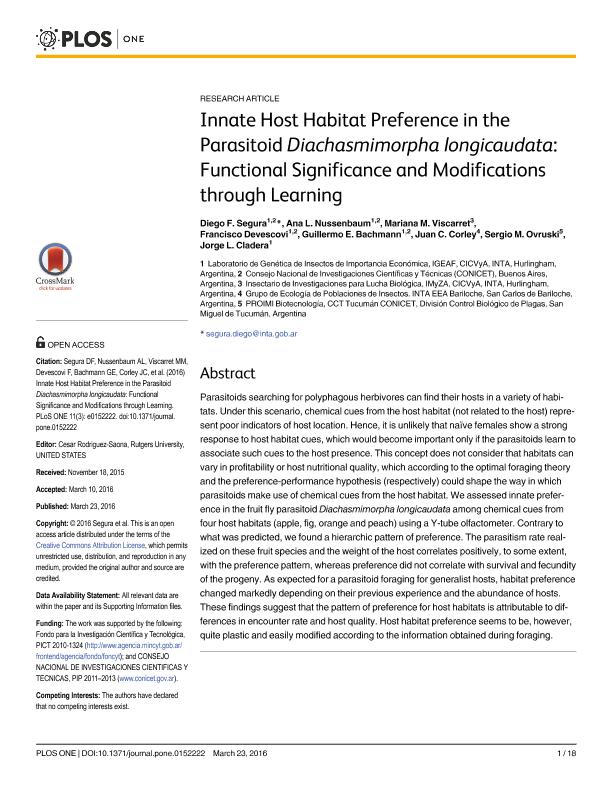Artículo
Innate host habitat preference in the parasitoid Diachasmimorpha longicaudata: Functional significance and modifications through learning
Segura, Diego Fernando ; Nussenbaum, Ana Laura
; Nussenbaum, Ana Laura ; Viscarret, MM; Devescovi, Francisco
; Viscarret, MM; Devescovi, Francisco ; Bachmann, Guillermo Enrique
; Bachmann, Guillermo Enrique ; Corley, Juan Carlos
; Corley, Juan Carlos ; Ovruski, Sergio M.; Cladera, Jorge Luis
; Ovruski, Sergio M.; Cladera, Jorge Luis
 ; Nussenbaum, Ana Laura
; Nussenbaum, Ana Laura ; Viscarret, MM; Devescovi, Francisco
; Viscarret, MM; Devescovi, Francisco ; Bachmann, Guillermo Enrique
; Bachmann, Guillermo Enrique ; Corley, Juan Carlos
; Corley, Juan Carlos ; Ovruski, Sergio M.; Cladera, Jorge Luis
; Ovruski, Sergio M.; Cladera, Jorge Luis
Fecha de publicación:
03/2016
Editorial:
Public Library of Science
Revista:
Plos One
ISSN:
1932-6203
Idioma:
Inglés
Tipo de recurso:
Artículo publicado
Clasificación temática:
Resumen
Parasitoids searching for polyphagous herbivores can find their hosts in a variety of habitats. Under this scenario, chemical cues from the host habitat (not related to the host) represent poor indicators of host location. Hence, it is unlikely that naïve females show a strong response to host habitat cues, which would become important only if the parasitoids learn to associate such cues to the host presence. This concept does not consider that habitats can vary in profitability or host nutritional quality, which according to the optimal foraging theory and the preference-performance hypothesis (respectively) could shape the way in which parasitoids make use of chemical cues from the host habitat. We assessed innate preference in the fruit fly parasitoid Diachasmimorpha longicaudata among chemical cues from four host habitats (apple, fig, orange and peach) using a Y-tube olfactometer. Contrary to what was predicted, we found a hierarchic pattern of preference. The parasitism rate realized on these fruit species and the weight of the host correlates positively, to some extent, with the preference pattern, whereas preference did not correlate with survival and fecundity of the progeny. As expected for a parasitoid foraging for generalist hosts, habitat preference changed markedly depending on their previous experience and the abundance of hosts. These findings suggest that the pattern of preference for host habitats is attributable to differences in encounter rate and host quality. Host habitat preference seems to be, however, quite plastic and easily modified according to the information obtained during foraging.
Palabras clave:
A
Archivos asociados
Licencia
Identificadores
Colecciones
Articulos(CCT - PATAGONIA NORTE)
Articulos de CTRO.CIENTIFICO TECNOL.CONICET - PATAGONIA NORTE
Articulos de CTRO.CIENTIFICO TECNOL.CONICET - PATAGONIA NORTE
Articulos(PROIMI)
Articulos de PLANTA PILOTO DE PROC.IND.MICROBIOLOGICOS (I)
Articulos de PLANTA PILOTO DE PROC.IND.MICROBIOLOGICOS (I)
Citación
Segura, Diego Fernando; Nussenbaum, Ana Laura; Viscarret, MM; Devescovi, Francisco; Bachmann, Guillermo Enrique; et al.; Innate host habitat preference in the parasitoid Diachasmimorpha longicaudata: Functional significance and modifications through learning; Public Library of Science; Plos One; 11; 3; 3-2016; 1-18
Compartir
Altmétricas



